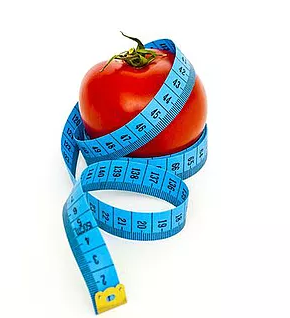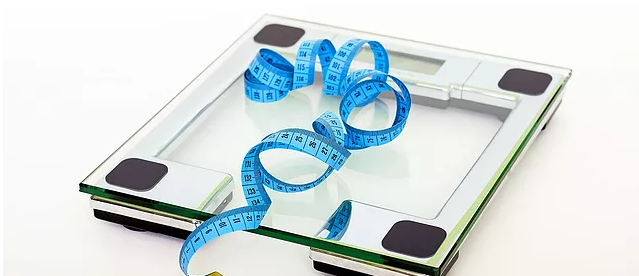[vc_row][vc_column][vc_column_text]

“So now that you’re walking to work, maybe we’ll see that weight come down.”
I froze when I heard the words come out of my doctor’s mouth. I had purposely avoided weighing in when I first arrived, as is my usual routine. Not because I’m afraid of what the scale will say – I know how much I weigh, within 5 pounds or so – but because for so many years the scale held a scary power over me to dictate my daily mood. It doesn’t have the same power now, but mainly because I have refused to weigh in on any sort of regular basis.
I had just been telling my doctor how I was starting to see a huge reduction in my daily stress level because I had traded in my 30 mile commute for a half hour walk to work to my new job. And that’s when she said it.
I haven’t focused on my weight when working on my health for several years now. Despite being at my heaviest weight in over 20 years, I’ve forged a solid truce with my body. Maybe even more than that – I’ve actually learned to love and appreciate my body just as it is, which is decidedly not thin. I’m healthy (my blood pressure is stellar, my cholesterol is fine), I’m active, and most importantly for me, I don’t have any more eating problems. So I found myself in the position of having to explain a few things to my doctor.
Let me rewind a bit.
I dieted to get and then stay thin most of my adult life. For much of this time, I was “successful,” but in addition to a lower weight, this success was also defined by more and more restrictive eating, to the point where thoughts of food preoccupied my life 24/7, vacillating between extremes of longing and fear. Longing when I wasn’t eating because visions of sugar plum fairies – or hamburger elves, or pizza pixies, or anything else made with more than a teaspoon of oil – danced in my head. Like, stomped, mosh pit style. And fear because on the rare occasions I would let myself have these foods, I felt like I would never be able to stop eating. I would never be able to fill the bottomless pit my stomach had become.
It wasn’t always like this; my efforts to eat healthier started out modestly. I made regular meals for myself and ate smaller portions; I learned to cook. But soon that wasn’t enough to maintain my weight loss, and as an added bonus, my weight loss never felt like it was enough. This, I learned, was dieting. You did it forever, and even when you reached your “goal” it wasn’t enough. At the height of my food and weight obsession, I remember thinking, “When do I get to be happy?”
A quick internet search reveals that somewhere between 45 million and 108 million people diet every year – as much as a third of the population of the U.S. This isn’t surprising considering most of us have either tried dieting or know someone (or many people) who have been on a diet. Dieting to lose weight is so ubiquitous that it has truly become a way of life in North America. We have been led to believe that losing weight is the only way to become healthy, and that manipulating our body size is completely within our control. But are either of those ideas even true? And what is the ultimate cost of all this dieting?
As a dietitian who studies and writes about disordered eating, I can tell you the cost is high. Eating disorders affect 30 million people in the US and are on the rise, especially in younger and younger children. Adolescent girls who diet are at 324% greater risk for obesity than those who don’t1. The bulk of research shows that while most diets do produce some weight loss in the beginning, most or all of the lost weight is regained within three to five years after the diet is started, and sometimes even more2,3,4. And while rising weights in the aggregate plateaued around 2000, no one’s weight seems to be going down despite all this dieting.
On top of the well-documented long-term failure of dieting, no one is getting happier about their weight. In a study on prevalence of disordered eating and weight control behavior from 2009, 53-72% of women across various races were currently dieting, and 74.5% of women reported that their concerns about shape and weight interfered with their happiness5.
All this begs the question: What good has dieting done us? Meanwhile, the weight loss industry continues to make around $60 billion a year. The problem is that many people aren’t aware of other options that move them toward better health. Despite all that dieting that has resulted in a pandemic of fractured relationships towards food, many people feel that more dieting – which didn’t work in the first place – is the answer.
After years of dieting, my relationship to food was a disaster –I was sure I would never be able to control myself around cheese or cookies or party hors d’oeuvres, that I couldn’t be trusted at a pizza party to not eat an entire pizza all on my own. I would binge after stretches of restriction; in either scenario, I wasn’t happy. Eventually I decided enough was enough. The eating madness, the self-loathing – it had to stop. That’s when I was saved by intuitive eating.
Intuitive eating, a term coined in the 1990s by dietitians Evelyn Tribole and Elyse Resch in their book of the same name, is literally the opposite of restrictive eating. This eating style is not about weight loss, it’s about rejecting the weight loss mentality and all that it does to make us distrust our appetites. At the core of it, it’s how children eat before the adults mess them up with exhortations to “clean your plate” and “eat your broccoli” and “no more dessert”– it is learning to trust your internal signals of hunger and fullness. What a revelation this was to me after years of ignoring those very signals! And what a difficult thing to learn after so many years of appetite distrust.
Rejecting a weight loss mentality is one of the hardest tasks for a long-time dieter to accomplish. We’ve been taught that losing weight is the only way to get healthy. But in many studies, fitness, not fatness, is actually the best predictor of health. On learning that, I decided to quit dieting and embrace whatever shape and size my body decided to be as I learned to eat in a way that brought me peace.
The idea of not dieting, of simply eating what we want, fills many with disbelief. They think that once they start to eat good food, they will never, ever be able to stop. It felt like this to me, too, but trust me when I say, there is such a thing as too much ice cream. Too much of any good thing is simply too much, and your appetite, once assured that it will not be denied and deprived, will start to normalize. It could take weeks, years or months, but those who have made the switch often report a complete sense of peace around eating. In the simplest terms, this is about pursuing health from a weight-neutral perspective. Eat well, exercise and let your weight be what it will.
And in 25 words or less, this is what I had to explain to my doctor. I told her briefly of my history of dieting and how I don’t pursue weight loss as a health goal anymore. I do healthy things – I eat balanced meals, I no longer overeat and I get daily activity. “That’s fine!” she said, and though I know she has a long way to go in understanding what I was really saying, for now, that was good enough. A win for me and my body.
1 Stice, Cameron, R. P., Killen, J. D., Hayward, C. & Taylor, C. B. (1999). Naturalistic weight-reduction efforts prospectively predict growth in relative weight and onset of obesity among female adolescents. Journal of Consulting and Clinical Psychology, 67, 967-974.
2 Field, A. E., Austin, S. B., Taylor, C. B., Malpeis, S., Rosner, B., Rockett, H. R., Gillman, M. W. & Colditz, G. A. (2003) Relation between dieting and weight change among preadolescents and adolescents. Pediatrics, 112(4), 900-906,)
3 Mann T1, Tomiyama AJ, Westling E, Lew AM, Samuels B, Chatman J. Medicare’s search for effective obesity treatments: diets are not the answer. Am Psychol. 2007 Apr;62(3):220-33.
4 Miller WC. How effective are traditional dietary and exercise interventions for weight loss? Med Sci Sports Exerc. 1999 Aug;31(8):1129-34.
5 (http://www.ncbi.nlm.nih.gov/pubmed/20179405)
[/vc_column_text][/vc_column][/vc_row]

